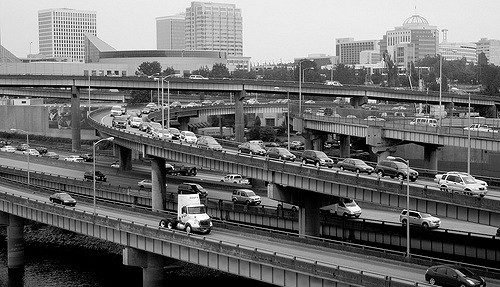Building safe and convenient transit and biking connections is essential, but if your local highway network is expanding, all those good things will get swamped by increases in car traffic.
In the 1970s, some American cities revolted against highway expansion and kept the worst excesses of the interstate construction spree in check. Those cities, like San Francisco and Portland, tend to be the most walkable and transit-oriented places in the nation today.
But in Portland that legacy is in jeopardy. There's now a developing consensus among public officials that some highway widening projects should get built, reports Jonathan Maus at Bike Portland:
Back in February, TriMet General Manager Neil McFarlane advocated for three freeway expansion projects in the Portland region during a speech in Washington County. After transportation activists turned up at a TriMet board meeting to express their disappointment in his stance, McFarlane accused the media who accurately covered his speech as being nothing more than “fake news” outlets.
Also last month, Oregon State Representative Rich Vial went public with his plans for a massive new highway on the west side he’s dubbed the “Northwest Passage”. Rep. Vial isn’t just sharing a pet project, he’s pushing House Bill 3231, which would give broad powers to local governments to build highways without the state’s support. That bill is being taken seriously enough to have earned a public hearing scheduled for this Wednesday (4/5).
At a panel last month Leah Treat, director of the Portland Bureau of Transportation said she supports the widening of I-5 through the Rose Quarter, as long as the project also builds new bikeways and other upgrades on adjacent surface streets. “There’s a need to address through-put,” she said, acknowledging that adding freeway capacity is the only way to get the “yes” votes needed for a transportation funding package.
Fortunately, a broad coalition has come together to push back against the "normalization" of highway expansions, Maus writes:
Two weeks ago a new coalition came together to demand that any freeway expansions come with equal funding for active transportation.
And on Thursday, 1000 Friends of Oregon encouraged their supporters to show up and testify against HB 3231...
Oregon’s environment and transportation advocacy groups seem to have learned a major lesson: Four years ago they sat on the sidelines as the Columbia River Crossing freeway expansion project nearly became a reality.
Highway expansion is an extreme idea that leads to incalculable negative externalities. If we are silent as it creeps back into the mainstream, it will become normalized. That’s a risk none of us should be willing to take.
More recommended reading today: Transportation for America shares a letter signed by 162 organizations urging the House and Senate to reject Trump's push to defund transit and TIGER grants. NextSTL reports that voters in St. Louis approved the expansion of Metrolink via Prop 1 while rejecting a tax for a new sports stadium. And the California High Speed Rail Blog weighs in on the Trump team's apparent enthusiasm for the Hyperloop, a comically fantastical and unproven transport concept promoted by Elon Musk.






